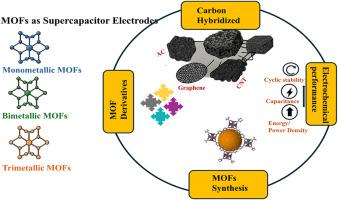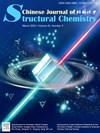A comprehensive review: MOFs and their derivatives as high-performance supercapacitor electrodes
IF 10.3
4区 化学
Q1 CHEMISTRY, INORGANIC & NUCLEAR
引用次数: 0
Abstract
An expanding human population and technological progress demand clean and effective energy-storing systems. Within the realm of energy-storing devices, supercapacitors (SCs) have grabbed huge focus owing to their high-power density, unique cycling stability, and fast charging discharging capabilities. Electrode material has a prominent impact on the effectiveness of SCs. Several types of electrode materials have been used, encompassing varied metal oxides, activated carbon, conducting polymers, and MOFs. Metal organic frameworks (MOFs) are considered emerging electrode candidates, which could be ascribed to the tunable porosity, large surface areas, and designed morphology. This review shows a detailed analysis of various mono-, bi-, and tri-metallic MOFs along with derivatives in SC applications, their structural characteristics, and synthetic strategies. It also critically evaluates MOFs potential to boost the SC's energy density, power density, stability, and conductivity. Also, it underscores their significance in the establishment of future-oriented energy storage applications.

mof及其衍生物作为高性能超级电容器电极的综述
不断增长的人口和技术进步需要清洁有效的能源储存系统。在储能设备领域,超级电容器因其高功率密度、独特的循环稳定性和快速充放电能力而备受关注。电极材料对SCs的效能有显著影响。已经使用了几种类型的电极材料,包括各种金属氧化物、活性炭、导电聚合物和mof。金属有机框架(mof)被认为是新兴的电极候选材料,这可以归因于可调的孔隙率,大表面积和设计的形态。本文详细分析了各种单、双、三金属mof及其衍生物在SC中的应用,以及它们的结构特点和合成策略。它还严格评估MOFs的潜力,以提高SC的能量密度、功率密度、稳定性和导电性。此外,它还强调了它们在建立面向未来的储能应用中的重要性。
本文章由计算机程序翻译,如有差异,请以英文原文为准。
求助全文
约1分钟内获得全文
求助全文
来源期刊

结构化学
化学-晶体学
CiteScore
4.70
自引率
22.70%
发文量
5334
审稿时长
13 days
期刊介绍:
Chinese Journal of Structural Chemistry “JIEGOU HUAXUE ”, an academic journal consisting of reviews, articles, communications and notes, provides a forum for the reporting and discussion of current novel research achievements in the fields of structural chemistry, crystallography, spectroscopy, quantum chemistry, pharmaceutical chemistry, biochemistry, material science, etc. Structural Chemistry has been indexed by SCI, CA, and some other prestigious publications.
 求助内容:
求助内容: 应助结果提醒方式:
应助结果提醒方式:


